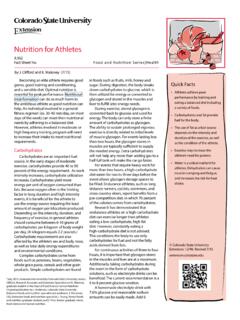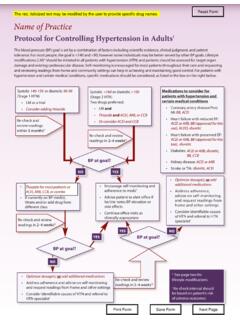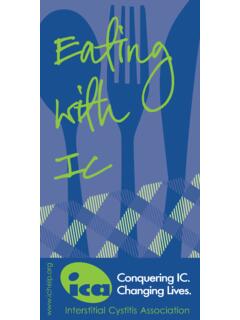Transcription of The Mediterranean Diet - Extension
1 Fact Sheet No. Food and Nutrition Series|Healthby J. Haas, L. Bellows, S. Ganster, and R. Moore*What is the Mediterranean diet ?The Mediterranean diet , sometimes referred to as the Greek Mediterranean diet or Mediterranean diet plan , is a diet in the sense that it describes a dietary pattern characteristic of those living in regions around the Mediterranean Sea. Although it is called a diet , the Mediterranean diet is not about cutting calories and restricting foods like many popular diet trends in America today. Instead, it is a way of life that involves enjoying a wide variety of whole, nourishing foods with friends and family, as well as practicing an active lifestyle.
2 This pattern was initially brought to the public s attention by Ancel Keys in his Seven Countries Study published in 1970. This landmark study was based on the observation that residents in regions around the Mediterranean Sea had the lowest rates of coronary heart disease (CHD) of any region studied. Figure 1 serves as an example of how components of the Mediterranean diet can fit into a healthy of the Mediterranean diet include: Whole grains, which include all parts of the grain; the bran, endosperm, and germ. Each of these parts has healthful nutrients, which are lost or reduced when they are refined into products such as white flour; A wide variety of vegetables and fruits, often eaten seasonally and locally;Quick Facts The Mediterranean diet encourages the enjoyment of a wide variety of whole nourishing foods and living an active lifestyle.
3 Dishes from the Mediterranean diet commonly feature ingredients like fresh tomatoes, olive oil, garlic, aromatic herbs, and spices. Following the Mediterranean diet may decrease one s risk for developing cardiovascular disease. The Mediterranean diet doesn t have to be expensive or complicated.*J. Haas, Colorado State University Extension specialist, and research associate; L. Bellows, Extension food and nutrition specialist, and assistant professor; and S. Ganster and R. Moore, former graduate students. 4/2014 Colorado State University Extension . 4 Legumes, nuts, and seeds as the main plant-based source of protein in the diet ; Olive oil as the main source of fat, which replaces less-healthful fats such as butter; Seafood, poultry, and eggs are consumed more often than other meats; Moderate amounts of dairy, mostly as yogurt and cheese, consumed a few times a week; Red wine, consumed moderately with meals; Physical activity - at least 30 minutes a day on most days of the week; Plenty of water to stay hydrated; Fresh herbs and spices; added to dishes for flavor and color in instead of excess salt.
4 The Mediterranean diet is appropriate for all ages. Whether young or old, the Mediterranean diet can be adopted to fit one s lifestyle. In fact, children who are introduced to a wide variety of nutritious foods and physical activity early in life are more likely to continue to enjoy and practice healthful habits throughout their lives. See Ta b l e 1 for a list of foods common to the Mediterranean of the Mediterranean diet for Long-term HealthMultiple observational studies conducted in Europe and the United States showed that adherence to the Mediterranean diet was associated with a reduced risk for various diseases and overall mortality. In fact, the more closely The Mediterranean Dietthe Mediterranean diet was followed the lower the incidence of certain diseases, including: Cancer Cardiovascular Disease Metabolic Syndrome Alzheimer s Disease Parkinson s DiseaseMetabolic SyndromeMetabolic Syndrome is diagnosed when one has at least 3 of the following conditions: abdominal obesity (large waistline); high triglycerides; low HDL ( good ) cholesterol; high blood pressure; and/or high fasting blood sugar levels.
5 Collectively, these risk factors raise ones risk for heart disease, diabetes, and other health concerning the Mediterranean diet continue to support its health benefits. Most recently, researchers conducted a large study in Spain investigating the Mediterranean diet and its relationship to cardiovascular disease. They found that participants who were at high cardiovascular risk and who followed a recommended Mediterranean diet had a 30% reduced risk of having a cardiovascular event relative to those who followed a recommended low-fat foods in the Mediterranean diet contribute to one's health Fruits and Vegetables are low-calorie, nutrient-dense, high fiber and abundant in beneficial bioactive compounds like antioxidants that help protect the body against toxins.
6 Research shows that greater consumption of fruits and vegetables is associated with lower risk for various chronic diseases. Whole-grains are minimally or not processed and therefore maintain high nutritional content, including fiber, B vitamins, minerals (including magnesium, iron, and selenium), and phytochemicals. Researchers have found that consumption of dietary fiber may lower blood pressure, cholesterol, body mass index (BMI), and triglycerides. Legumes are a good source of protein, minerals, fiber, complex carbohydrate, and polyunsaturated fatty acids. Findings suggest that increased consumption of legumes is associated with reduced risk for CHD, obesity, type 2 diabetes, and some cancers.
7 Seafood and Olive Oil are both excellent sources of the heart-healthy monounsaturated fatty acids (MUFAs) and low in saturated fat. Research shows that MUFAs increase HDL (good) cholesterol, which acts as an additional protective mechanism against CHD. Olive oil possesses anti-inflammatory, antioxidant and anti-clotting properties. Seafood, especially fatty fish such as salmon, tuna, and sardines, are an excellent source of the omega-3 fatty acids EPA and DHA. The health benefits associated with omega-3 fatty acids include reduced risk for heart attack and stroke. For more information on the benefits of omega-3 fatty acids, see fact sheet Omega-3 Fatty the Mediterranean diet Start small: Following the Mediterranean diet may seem daunting at first.
8 However, it does not have to be an all-or-nothing decision. In fact, following all parts of the Mediterranean diet every single day of the week is not necessary in order to improve health. Some individuals may experience health benefits by starting to follow just one or two parts the diet . Make each change gradually: Some people may feel overwhelmed by the Mediterranean diet , but by making changes gradually, following the diet can begin to feel more comfortable. For example, starting off may include at least 30 minutes of physical activity a day or consuming at least 2-3 fruits and vegetables a day. This can be done at a rate that is comfortable, and as time goes on, more changes can be made.
9 Keep it simple: Following the diet doesn t need to include Greek artisan breads, expensive olive oil, or an aged bottle of wine. Many of the foods that are part of the Mediterranean diet can be found at most grocery stores. Some tips to consider at the grocery store: Try choosing more fruits and vegetables than other items; Select breads with whole-grain or whole-wheat as the first ingredient listed on the food label; Try the whole-wheat pasta or brown rice instead of white; Choose extra virgin olive oil when considering oils or fats for cooking; If choosing wine, any bottle of red will do, even lower cost bottles have the same health benefits. Keep it affordable: Greek yogurt vs.
10 Regular yogurt: Greek yogurt is often times more expensive than regular yogurt. However, there is little difference in overall nutritional value. Greek yogurt is thicker, is a little less sour, and tends to have higher protein and may have less calcium than regular yogurt. Choosing regular yogurt may save some money. Fish options: Fresh fish can often be expensive and hard to get in some areas. Fresh- caught frozen fish may be more available and sometimes less expensive. Canned fish is a good alternative for those on a budget or who don t have access to fresh or frozen fish. Try canned tuna or salmon. If opting for fresh or frozen fish, there is a variety to choose from and the price ranges vary.















